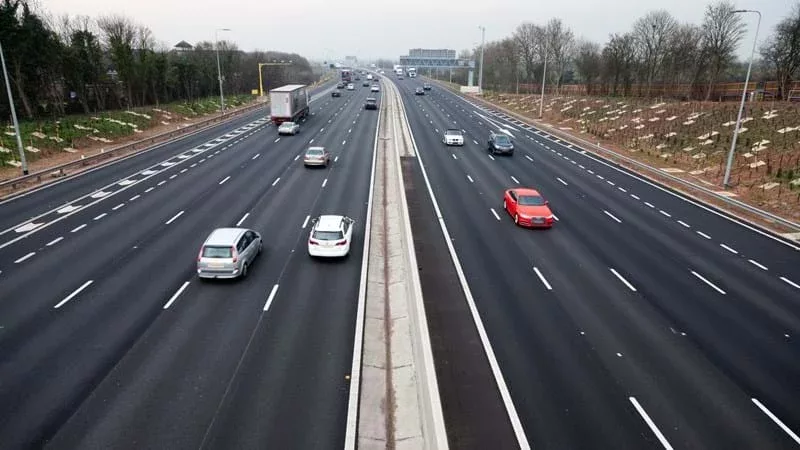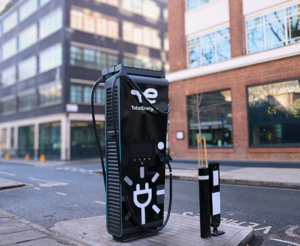National Highways has teamed up with Connected Places Catapult to find innovative solutions for net zero carbon maintenance and construction in an exciting new competition worth £1.7m launched today. The winners could receive £30,000 to create a detailed trial proposal to test their idea on the road network and a further £80,000 to make their plan a reality.
As well as wanting to make its road network net zero by 2050, National Highways also aims to have its maintenance and construction emissions net zero by 2040. There are a number of intriguing challenges which have been set as part of the competition to help National Highways reach its environmental goals.
Dr Joanna White, National Highways Roads Development Director said: “We want to speed up innovation within our sector and adopt new solutions. The innovation accelerator will help take potential solutions and drive them through the research and testing phases.”
Melissa Giusti, National Highways Project Manager added: “We are hosting this open competition to attract new ideas that we haven’t yet trialled, tested or even thought of ourselves. Have you got innovative ideas that could help us achieve our net zero carbon goals?” National Highways is offering the funding to innovators for the development of novel solutions that could make a real difference to how highways are built and maintained. This competition offers an exciting opportunity for organisations to work with National Highways, trialling low carbon construction and maintenance innovations. The aim of the competition is to reach a wider pool of innovators, exploring the innovation potential outside of National Highways’ existing supply chain, that will make a difference lowering our carbon footprint. It will allow smaller enterprises, which haven’t traditionally had the opportunity to work directly with National Highways, to showcase their ideas and win the chance to take them out on the road network.
Here are more details about the challenges which have been set:
Challenge 1: Alternative materials
National Highways wants to reduce its emissions from cement, concrete, asphalt and steel by developing or applying alternative materials and techniques. These options should reduce emissions by 50% or more, if possible, compared to the materials used today, and should be usable for a large proportion of all applications including major projects and renewal schemes. For these materials any secondary impacts (e.g. on cost and safety) and the full lifecycle impact on construction and maintenance should be considered.
Challenge 2: Decision-making enablers for asset management and whole life value of assets As new build activities are projected to reduce over the coming years, maintenance and renewals of highway assets will form an increasingly important part of asset management, especially in increasing longevity of assets. First, National Highways is interested in innovations which can improve asset management decision-making considering whole lifecycle value, including carbon emissions (alongside other criteria including customer value and cost). Second, it is looking for innovations able to support decision-making for future maintenance choices, promoting planned, predictive, and preventive interventions. These innovations could leverage information (e.g. from sensors, cameras, third parties such as vehicle telemetry, etc.), supporting asset management and emissions reduction in a way that is accessible, repeatable, and aligning to quality standards set in our strategies.
Challenge 3: Enablers for the circular economy in construction and maintenance of highway assets
National Highways is interested in innovations which can contribute to reusing, redeploying and recycling materials and assets in construction, especially those not recycled consistently to their highest value today. This includes any digital or non-digital enablers supporting these activities and associated calculation of impact. The enablers can also include novel technologies or techniques to assess suitability for reuse/redeployment at different locations; with a focus on using potential waste materials at their highest value. National Highways is also interested in innovations contributing to “design for deconstruction”, enabling the use of decommissioned and recycled materials and assets for different purposes from construction through to maintenance, considering the end-to-end lifecycle of the asset.
Open Challenge Although this accelerator focuses primarily on the three challenge areas described above, National Highways is also open to additional innovative ideas which can contribute to its target of zero emissions in maintenance and construction by 2040. Example areas (not exclusive) where applications are welcome are material waste reduction technologies, processes and enablers, modular construction and standard designs, 3D printing of construction assets, smart contracts, data analytics of emissions, material storage, and methods and techniques to accelerate certification of materials and changes to standards.
On offer to those successfully selected will be pitch coaching, marketing strategy and investment support, as well as trial design training, deployment support, trial monitoring and evaluation, plus a demonstration day for investors, industry and potential customers and ten months’ tailored business support.
This competition is funded through the National Highways Designated Funds; ring-fenced funding that we use to invest in and support initiatives that deliver lasting benefits for road users, the environment and communities across England.
The innovation accelerator seeks to address part of this process by taking low maturity new materials and solutions and driving them through a consistent, standardised process of prioritisation, feasibility and initial trialling, with the aim of assessing viability for wider testing and adoption.
The National Highways Accelerating Low Carbon Innovation Programme involves two phases. In phase 1, up to 10 SMEs will be awarded funding between £15,000 and £30,000 to develop innovative trial proposals in collaboration with National Highways and their Tier 1 suppliers. In phase 2, further funding up to £80,000 will be provided to support a selected number of these organisations to trial their solutions. Funds will be allocated based on the trial proposals submitted by applicants. All funding will be subject to final investment approval from National Highways.
The organisation will welcome applications from Tier 1 organisations developing net zero solutions. Tier 1s can apply individually or form a consortium with an SME collaborator. It will select up to five applications from Tier 1 organisations. Please note that Tier 1s will not receive any funding as part of the programme.
National Highways is interested in innovative solutions that can address challenges in at least one of the three thematic areas detailed above. To be eligible for this programme:
- You must have a UK company address
- Preferably an innovative solution at TRL 5-7
- You must be able to address the challenge statements with your solution
- You must be willing to travel on occasion for face-to-face meetings (but most of the programme will be conducted virtually)
The competition is open to entries from (27 March) until midnight of the 30 April 2023 to enter. Please see link to the CPC opportunity page: https://cp.catapult.org.uk/opportunity/national-highways-accelerating-low-carbon-innovation-programme Webinar page: https://cp.catapult.org.uk/event/national-highways-low-carbon-webinar
























